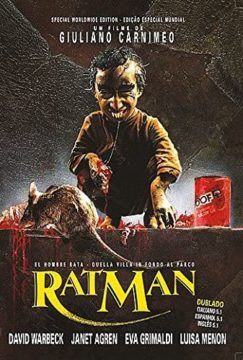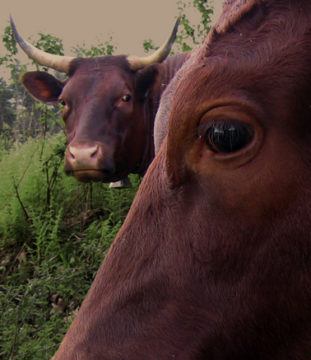by Charlie Huenemann
 It was announced last week that scientists have integrated neurons from human brains into infant rat brains, resulting in new insights about how our brain cells grow and connect, and some hope of a deeper understanding of neural disorders. Full story here. And while no scientist would admit they are working toward the development of some Rat Man who will escape the lab and wreak havoc on some faraway island or in the subways, it’s impossible not to wonder.
It was announced last week that scientists have integrated neurons from human brains into infant rat brains, resulting in new insights about how our brain cells grow and connect, and some hope of a deeper understanding of neural disorders. Full story here. And while no scientist would admit they are working toward the development of some Rat Man who will escape the lab and wreak havoc on some faraway island or in the subways, it’s impossible not to wonder.
There are some legitimate and difficult ethical questions in this territory, such as whether we should work toward “curing” all conditions labeled as “disorders”, including those conditions that have become woven into people’s lives so thoroughly that they would rather not lose them. Autism, for example, can be a terrible burden in some cases, but in others it serves as a valued feature of one’s individuality, an element in the core of who they are. It’s difficult to follow the precept of doing no harm as we dig deeper into human natures and find it’s not always obvious what counts as a harm. There is a medical/pharmaceutical mindset that likes to pound down any nail sticking up, which is running into the fact that some nails prefer to stick up, thank you very much.
But as we leave those problems to more insightful minds, I would like to turn instead to an illegitimate and silly worry, which we shall call “Ewww”:
Ewww = What if my neurons end up in a rat brain? Would I feel its whiskers twitching, feel hungry for garbage, and find fulfillment by running endlessly inside a little wheel?
As I said, it’s not a legitimate worry, but it’s hard for many of us not to feel a tug in its direction, because many of us are entranced by illusions about consciousness. Read more »

 Visualize a purple dog, the exercise said. Imagine it in great detail; picture it approaching you in a friendly way. So I did. I thought of a spaniel: long silky ears, beautiful coat, all a nice lilac color. Pale purple whiskers. The dog was friendly but not effusive. I’m not a dog person, but I wouldn’t have minded meeting this dog. All right, now what? The exercise went on to say something along the lines of “Wonderful! If you can visualize that purple dog, can’t you imagine your own life as being full of amazing possibilities?”
Visualize a purple dog, the exercise said. Imagine it in great detail; picture it approaching you in a friendly way. So I did. I thought of a spaniel: long silky ears, beautiful coat, all a nice lilac color. Pale purple whiskers. The dog was friendly but not effusive. I’m not a dog person, but I wouldn’t have minded meeting this dog. All right, now what? The exercise went on to say something along the lines of “Wonderful! If you can visualize that purple dog, can’t you imagine your own life as being full of amazing possibilities?”




 The Fate of the Animals: On Horses, the Apocalypse, and Painting as Prophesy (Three Paintings Trilogy), by Morgan Meis, Slant
The Fate of the Animals: On Horses, the Apocalypse, and Painting as Prophesy (Three Paintings Trilogy), by Morgan Meis, Slant Scheduled departure at Dulles came and went as we waited for the last passenger to board. Although the non-smoking section in the rear cabin was full, the smoking section where I sat was half empty. Death by asphyxiation on the flight to Paris was a distinct possibility but with three empty, adjacent seats in the centre nave there was some chance that my obituary might read, “She died peacefully, in recumbent sleep.”
Scheduled departure at Dulles came and went as we waited for the last passenger to board. Although the non-smoking section in the rear cabin was full, the smoking section where I sat was half empty. Death by asphyxiation on the flight to Paris was a distinct possibility but with three empty, adjacent seats in the centre nave there was some chance that my obituary might read, “She died peacefully, in recumbent sleep.” Indifference is an attitude first theorised as a philosophical stance by ancient Greek Stoic philosophers from the 3rd century BC. It was conceived as the right attitude to cultivate in reaction to indifferent things. What was surprising were the things the Stoics considered to be indifferent and hence require us to be indifferent to. Not your usual ‘whether the number of hairs on your head is odd or pair’, or the number of billions of stars in the galaxy, or even what colour underwear your boss wears – though in some circumstances, the latter can start becoming titillating. And titillation is of course what it’s all about. It’s the tickle that spurs the Stoic to resist it. Resisting what exactly? Feeling, uncontrolled gratification, heart-melting, giving in, touching, kiss-&-make-up-ing.
Indifference is an attitude first theorised as a philosophical stance by ancient Greek Stoic philosophers from the 3rd century BC. It was conceived as the right attitude to cultivate in reaction to indifferent things. What was surprising were the things the Stoics considered to be indifferent and hence require us to be indifferent to. Not your usual ‘whether the number of hairs on your head is odd or pair’, or the number of billions of stars in the galaxy, or even what colour underwear your boss wears – though in some circumstances, the latter can start becoming titillating. And titillation is of course what it’s all about. It’s the tickle that spurs the Stoic to resist it. Resisting what exactly? Feeling, uncontrolled gratification, heart-melting, giving in, touching, kiss-&-make-up-ing.
 Deborah Roberts. Shankia and Grace. 2021.
Deborah Roberts. Shankia and Grace. 2021. According to the meta-charity
According to the meta-charity 


